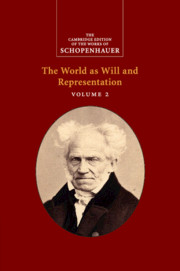Chapter 21 - Review and More General Consideration
Published online by Cambridge University Press: 30 June 2022
Summary
If the intellect were not secondary, as the two preceding chapters have shown it to be, then we would not find that everything that takes place in the absence of intellect, i.e. without the intervention of representation (such as, for instance, the procreation, development, and maintenance of the organism, the healing of wounds, the replacement or vicarious supplementation of mutilated parts, the salutary crisis in illnesses, the works of animal mechanical drives and the creation of instinct in general) turns out so infinitely better and more perfectly than things that take place with the assistance of intellect, namely all conscious and intentional human products and accomplishments which, compared to the former, are the works of a blundering amateur. Overall, nature signifies that which acts, drives, and creates without the mediation of the intellect. Now the fact that this is identical with what we find in ourselves as will is the single and sole theme of this Second Book as well as the essay On Will in Nature. The possibility of this fundamental insight is based on the fact that the will is immediately illuminated in us by the intellect, which comes forward in our own case as self-consciousness; otherwise we would have just as little a chance of getting to know it better within ourselves as without, and we would be forever stymied when confronted with the unfathomable forces of nature. We need to think away the assistance of the intellect when we grasp the essence of the will in itself, if we want to penetrate as far as possible into the interior of nature.
This is why, by the way, my direct antipode among philosophers is Anaxagoras, since he assumed that a nous, an intelligence, something that represents, is primary and primordial, and that everything else came from this; he is considered the first to take such a view. According to this view, the world existed earlier in mere representation than in itself; while I believe that it is the will devoid of cognition that grounds the reality of things, whose development must have already progressed fairly far before representation and intelligence finally come about in animal consciousness; so that for me, thinking comes about last of all.
- Type
- Chapter
- Information
- Schopenhauer: The World as Will and Representation , pp. 282 - 284Publisher: Cambridge University PressPrint publication year: 2018

